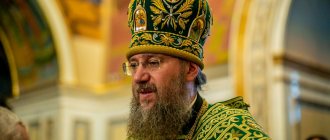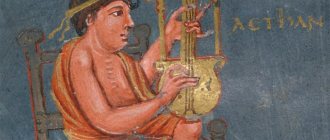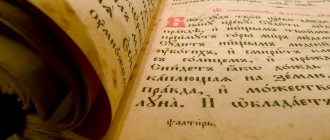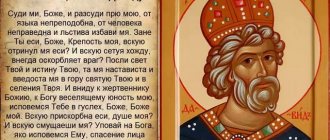Text of Psalm 43
According to the church canon, Psalm 43 is sung in the Old Church Slavonic language in churches. Not everyone works with this version of the text at home, mostly trained believers. Others, to better understand the meaning of the song, resort to reading a modern translation into Russian.
In Church Slavonic
In Russian
Psalm 43 in Russian:
1 To the director of the choir. Teaching. Sons of Korah.
2 God, we have heard with our ears, our fathers told us the work that you did in their days, in the days of old:
3 By Thy hand Thou hast destroyed the nations, and planted them; defeated the tribes and drove them out;
4 For they did not acquire the land with their sword, nor did their arm save them, but Your right hand and Your arm and the light of Your countenance, for You favored them.
5 God, my King! You are the same; grant salvation to Jacob.
6 With You we will gore our enemies with the horns; in Your name we will trample underfoot those who rise up against us:
7 For I will not trust in my bow, neither will my sword save me;
8 But You will save us from our enemies, and put to shame those who hate us.
9 Let us boast in God every day, and let us glorify Your name forever.
10 But now You have rejected and put us to shame, and You do not go out with our armies;
11 We have fled from the enemy, and those who hate us are plundering us;
12 You gave us like sheep to be eaten and scattered us among the nations;
13 You sold Your people without profit and did not raise their price;
14 He gave us over to be reproached by our neighbors, to be mocked and mocked by those who live around us;
15 You have made us a byword among the nations, a head among foreigners.
16 Every day my shame is before me, and shame covers my face
17 from the voice of the slanderer and the slanderer, from the sight of the enemy and the avenger:
18 All this came upon us, but we did not forget You and did not break Your covenant.
19 Our heart has not turned back, neither have our feet turned away from Your path,
20 When You crushed us in the land of dragons and covered us with the shadow of death.
21 If we had forgotten the name of our God and stretched out our hands to a strange god,
22 Would not God have required this? For He knows the secrets of the heart.
23 But for Your sake they kill us every day; we are counted as sheep doomed to the slaughter.
24 Arise, that you are sleeping, O Lord! wake up, don't give up forever.
25 Why do you hide your face, forgetting our sorrow and our oppression?
26 For our soul is humbled to the dust, our bowels cling to the earth.
27 Rise up to help us and deliver us for the sake of Your mercy.
Interpretation
The meaning of Psalm 43 is fully revealed to those who carefully study the interpretation of individual songs of the ancient work:
- Verses 1 to 6: The author points out that the Jews received Palestine only thanks to God's help. The Almighty was merciful to this people, granting them his protection. Here His strength is compared to the strength of every animal that repels its enemies. For Jews, the main military leader is God.
- Verses 7 to 13: The righteous, chosen by the One Creator, do not part with the Icon of the Covenant. God's help is visible everywhere, but not on the “young side”, where the people suffer from plunder. This part of the song also mentions human trafficking, which, although unprofitable, was commonplace in those days. As a result of such trades, many Jews ended up in Greece and Egypt.
- Verses 14 to 20: The chosen people were scattered and faced ridicule and mockery. Each of the Jews who fell into slavery was considered a corpse. The emphasis in the poems is on the feeling of hopelessness.
- Verses 21 to 26: God knows all mysteries. He knows that the Jews were faithful to Him, differing from others in their devotion. At the same time, they do not see proper help from above, which makes them grieve.
Psalm 43 read:
1 To the end, O children of Korah, to the understanding
2 O God, He made us hear, and our fathers made known unto us the work which thou didst in their days, even in the days of old. 3 Thy hand has consumed the tongues, and I have planted you, you have embittered the people, and you have driven me out. 4 For we have not inherited the earth with our sword, and no arm has saved them, but Thy right hand, and Thy arm, and the illumination of Thy countenance, because Thou hast pleased in them. 5 You yourself are my King and my God, commanding the salvation of Jacob. 6 Because of You we will tear down our enemies by their horns, And because of Your name we will despise those who rise up against us. 7 For I do not trust in my bow, and my sword will not save me. 8 For you have saved us from those who afflicted us, and you have put to shame those who hated us. 9 Let us glory in God all the day long, and confess in your name forever. 10 Now thou hast rejected and put us to shame, and thou hast not gone forth, O God, in our strength. 11 You brought us back in the presence of our enemies, and those who hated us plundered themselves. 12 You gave us food like sheep, and you scattered us among the nations. 13 Thou hast given Thy people without price, and there is not much in our shouting. 14 You have made us a reproach to our neighbors, an imitation and a reproach to those around us. 15 Thou hast made us a byword among the people, to bow the head among the people. 16 All day long my shame is before me, and the coldness of my face covers me 17 from the voice of reproach and slander, from the face of the enemy and the one who drives out. 18 All this has come upon us, and we have not forgotten You, nor have we failed in Your covenant. 19 And do not our heart turn back, and you have turned our paths away from Your path. 20 For Thou hast humbled us in the place of bitterness, and the shadow of death has been covered. 21 Even if we forget the name of our God, and if we lift up our hands to a strange god. 22 Will not God seek these? That is the secret news of the heart. 23 For Your sake we are killed all the day long, counted as sheep of the slaughter. 24 Arise and sleep, O Lord? Resurrect and do not completely deny. 25 Do you avert all your face? Do you forget our poverty and our sorrow? 26 For our soul is humbled into the dust, our belly cleaves to the earth. 27 Arise, Lord, help us and deliver us in Your name.
Uses
Catholic Church
This psalm has traditionally been read or sung since the reign of St. Benedict 530 AD, in the office Praises Tuesday, next Psalm 50.
First of all, it was a psalm that the priest read before entering the altar to celebrate mass.[3] In the traditional Roman rite (also known as the Trident Mass or unusual form), the psalm is read by the priest and altar servers during prayers at the foot of the altar.[4] The reading of this psalm at the beginning of Mass was prohibited in 1964 by the Instruction for the Observance of Liturgical Standards, Inter Oecumenici
.[5]
in the Liturgy of the Hours today Psalm 43 is read or sung at the praises of Tuesday of the second week of the four-week psalter.
Music
Michel Richard Delalande wrote a large motet (P.38) for this psalm in 1693.
Latin translations
Clementine Vulgate
See also: Clementine Vulgate
The Clementine Vulgate was officially adopted as part of the Roman Breviary in 1592. It was also used in the form of dialogue as a preparation for Mass, in what is now called the Extraordinary Form.
Judica me, Deus, et discerne causam meam de gente non sancta: ab homine iniquo et doloso erue me. Quia tu es, Deus, fortitudo mea: quare me repulisti? et quare tristis incedo, dum affligit me inimicus? Emitte lucem tuam et veritatem tuam: ipsa me deduxerunt, et adduxerunt in montem sanctum tuum, et in tabernacula tua. Et introibo ad altare Dei, ad Deum qui laetificat juventutem meam. Confitebor tibi in cithara, Deus, Deus meus. Quare tristis es, anima mea? et quare conturbas me? Spera in Deo, quoniam adhuc confitebor illi, salutare vultus mei, et Deus meus.
Translation to piano
See also: Latin Psalters § Versio Piana
The Piano Psalter was completed in 1945 and subsequently printed in most Breviaries.
Ius redde mihi, Deus, et age causam meam adversus gentem non sanctam; ab homine doloso et iniquo libera me, Quia tu es, Deus, fortitudo mea: Quare me reppulisti? Quare tristis incedo, ab inimico oppressus? Emitte lucem tuam et fidelitatem tuam: ipsae me ducant, adducant me in montem sanctum tuum et in tabernacula tua. Et introibo ad altare Dei, ad Deum laetitiae et exsultationis meae, Et laudabo te cum cithara, Deus, Deus meus! 5 Quare de primeris, anima mea, et tumultuaris in me? Spera in Deum: quia rursus Celebrabo eum, Salutem vultus mei et Deum meum.
Nova Vulgate
See also: Nova Vulgate
In the Nova Vulgate, a new translation from the Hebrew was completed in 1979 for liturgical use. This is the version used in the current standard edition
Liturgia Horarum
.[6][7]
Iúdica me, Deus, et discérne causam meam de gente non sancta; ab hómine iníquo et dolóso érue me. Quia tu es Deus refúgii mei; Quare me reppulísti, et quare tristis incédo, dum afflígit me inimícus? Emítte lucem tuam et veritátem tuam; ipsæ me dedúcant et addúcant in montem sanctum tuum et in tabernácula tua. Et introíbo ad altáre Dei, ad Deum lætítiæ exsultatiónis meæ. Confitébor tibi in cíthara, Deus, Deus meus. Quare tristis es, ánima mea, et quare conturbáris in me? Spera in Deo, quóniam adhuc confitébor illi, salutáre vultus mei et Deus meus.
Stuttgart Vulgate
See also: Stuttgart Vulgate
The Stuttgart Vulgate, completed in 1969, is a non-liturgical version translated for scholarly purposes.
In Church Slavonic in Russian orthography. Text of prayer standing before the Lord.Iudica me Deus et discerne causam meam gente non sancta a viro doloso et iniquo salva me. Tu enim Deus fortitudo mea quare proiecisti me quare tristis incedo adfligente inimico. Mitte lucem tuam et veritatem tuam ipsae ducent me et Introduction ad montem sanctum tuum et ad tabernaculum tuum. Et introibo ad altare tuum ad Deum laetitiae et exultationis meae. Et confitebor tibi in cithara Deus Deus meus, quare incurvaris anima mea et quare conturbas me? Expecta Dominum quoniam adhuc confitebor ei salutibus vultus mei et Deo meo.
There is no victory without God's help
— — — — — — — — — — — — — — — — — — — — — — — —
God, our ears were filled with hearing, And our fathers told us the work that You did in their days, in the days of old.
Thy hand has consumed the tongues, and I have planted them: Thou hast embittered the people, and I have driven them out.
You did not inherit the earth with your sword, nor did your arm save them: but your right hand, and your arm, and the illumination of your face, as you pleased in them.
You yourself are my King and my God, the Commander of Jacob’s salvation.
Because of You we will tear our enemies' horns, And because of Your name we will despise those who rise up against us.
For I do not trust in my bow, And my sword will not save me: Thou hast saved us from those who oppressed us, And thou hast put to shame those who hate us.
Let us boast in God all day long, and confess Your name forever.
Now you have rejected and put us to shame, and you will not go away, O God: in our power.
You brought us back in the face of our enemies, and those who hated us plundered them for themselves.
You gave us like sheep to eat, and you scattered us among the nations.
Thou hast given Thy people without price, And there is not a multitude in our exclamations.
Thou hast ordained the reproach of our neighbors, the imitation and desecration of those around us.
Thou hast made us a byword among the people, the nod of the head among the people.
All day long my shame is before me, And the coldness of my face covers me, From the voice of reproach and slander, From the face of the enemy and expelling.
All this has come upon us, and we have not forgotten You, nor have we been untruthful in Your covenant, nor have our hearts turned back: And You have turned our paths away from Your path.
As if You have humbled us in the place of bitterness, And covered the shadow of death.
If we have forgotten the name of our God, And if we have lifted up our hands to a foreign god.
Is it not God who will seek these? That is the secret news of the heart.
For Your sake we are killed all day long, We are counted as sheep of the slaughter.
Arise, write off everything, O Lord; Resurrect, and do not completely reject.
You turn away Your face; You forget our poverty and our sorrow; For our soul has been humbled into the dust, Our womb has fallen into the earth.
Arise, Lord, help us, And deliver us in Your name.
In Russian.
An educational text for understanding unfamiliar words and expressions of the Church Slavonic language. There is no victory without God's help
— — — — — — — — — — — — — — — — — — — — — — — —
God, we have heard with our ears, Our Fathers told us about the work that You did in their days, in the days of old.
Thou hast destroyed nations with Thy hand, and planted them; He defeated the tribes and drove them out.
For they did not acquire the land with their sword, Nor did their arm save them, But Your right hand and Your arm And the light of Your countenance, For You favored them.
God, my King! You are the same; Grant salvation to Jacob.
With You we will gore our enemies with the horns; In Your name we will trample underfoot those who rise up against us.
For I do not trust in my bow, And it is not my sword that will save me; But You will save us from our enemies, And you will shame those who hate us.
Let us boast in God every day, And we will glorify Your name forever.
But now You have rejected and disgraced us, And You do not go out with our armies.
He put us to flight from the enemy, And those who hate us rob us.
You gave us up like sheep to be eaten and scattered us among the nations.
You sold Your people without profit and did not raise their price.
He gave us over to be reproached by our neighbors, to be ridiculed and mocked by those living around us.
You have made us a byword among the nations, a nod of the head among foreigners.
Every day my shame is before me, And shame covers my face From the voice of the slanderer and slanderer, From the gaze of the enemy and the avenger.
All this came upon us, but we did not forget You and did not break Your covenant. Our heart has not turned back, And our feet have not strayed from Your path.
When You crushed us in the land of dragons And covered us with the shadow of death.
If we forgot the name of our God and stretched out our hands to a foreign god.
Wouldn't God have required this? For He knows the secrets of the heart.
But for Your sake they kill us every day, They consider us as sheep doomed to the slaughter.
Arise, that you are sleeping, Lord! Wake up, don't give up forever.
Why do you hide Your face, Do you forget our sorrow and our oppression? For our soul is humbled to dust, Our womb clings to the earth.
Arise to our aid And deliver us for Thy mercy's sake.
PRAYER RULE FOR COMMUNION (sample of preparation during the week):
Monday
(according to secular style - on Sunday evening after Little Compline): Canon of Repentance to our Lord Jesus Christ.
Tuesday
: Canon of prayer to the Most Holy Theotokos.
Wednesday
: Canon to the Guardian Angel.
Thursday
: Canon to Saint John the Baptist.
Friday
: Canon, Akathist or prayers to your patron saint, whose name you bear.
Saturday
: To the Sweetest Jesus.
Sunday
: the first (evening) part of the procession to Holy Communion. The second (morning) part of the sequence is read after the 1st hour.
Attendance at the Divine Liturgy on Sunday is a MANDATORY and IMMEDIATE rule for an Orthodox believer, as is the communion of the Holy Mysteries of Christ. An exception to this RULE is possible only due to a serious or contagious illness, as well as in the event of a natural or social disaster, when it is impossible to get to church.
Note: in this prayer rule and the attached Orthodox calendar, the beginning of a new day is considered to be 18:00.





